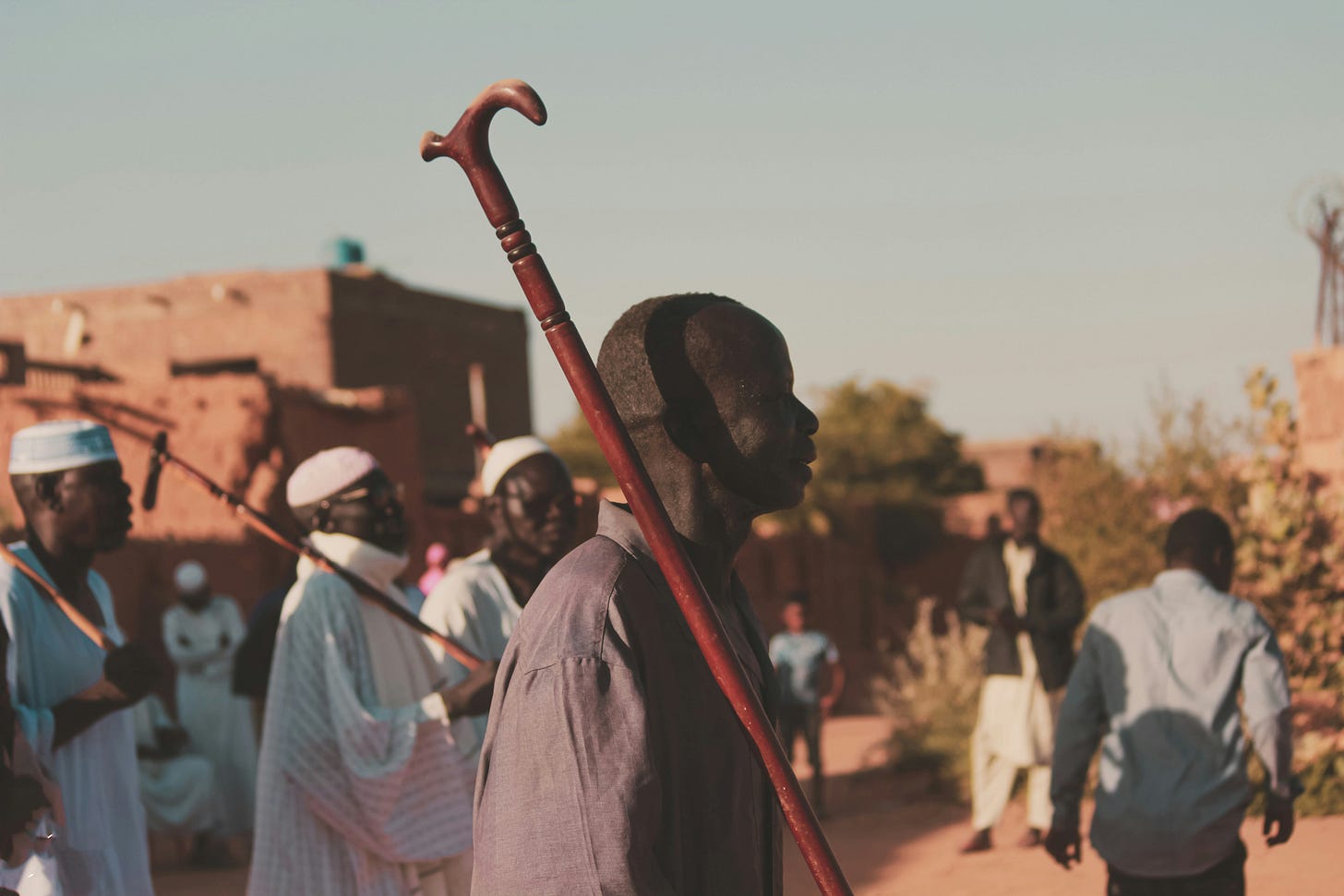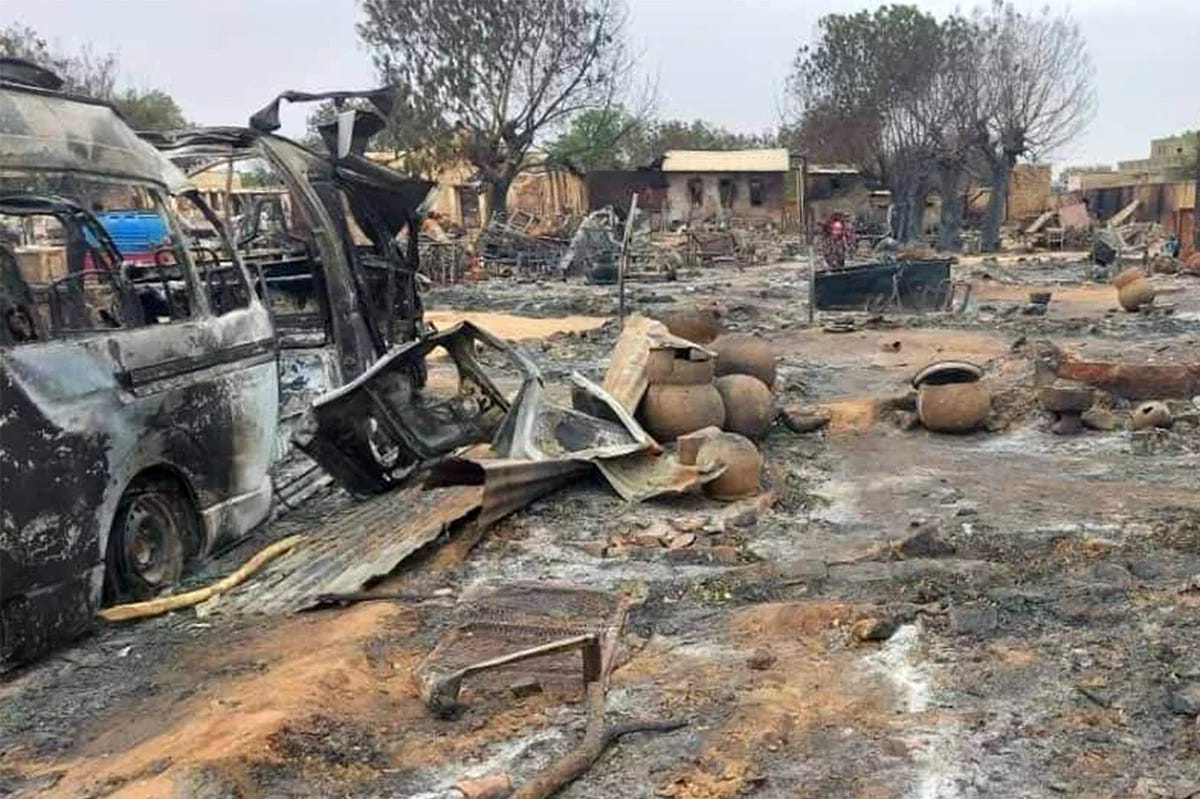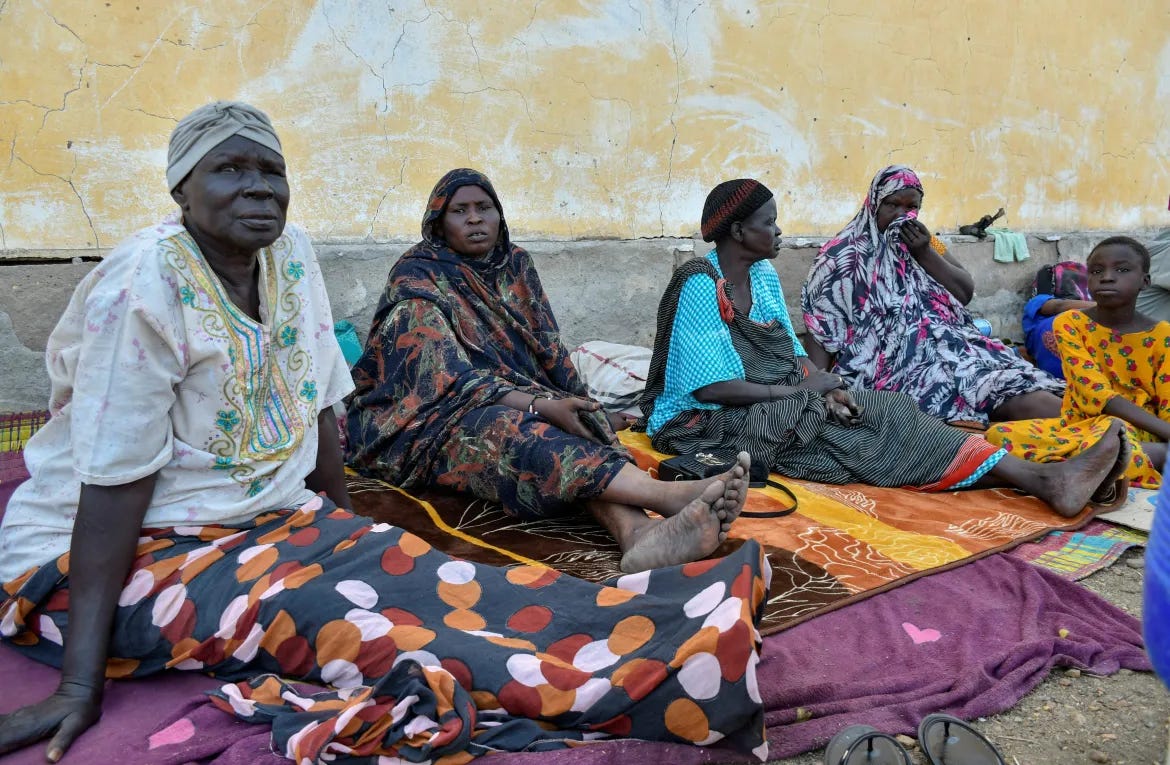Escalating Violence in Sudan: Global Bodies Recognize Mass Killings as Genocide
The Rapid Support Forces’ role in massacres, the international response, and the ongoing humanitarian crisis in Sudan.
Content Warning: This article contains discussions of war, violence, ethnic cleansing, and sexual assault. Reader discretion is advised.
Since 2023, Sudan has been embroiled in a civil war between the Sudanese Armed Forces (SAF) and the paramilitary group Rapid Support Forces (RSF), leaving millions displaced and hundreds of thousands killed. The RSF, which has a history of ethnic cleansing against non-Arab Sudanese people, has been accused of committing genocide during the conflict. This marks the second time in 20 years that genocide has been declared in the northeastern African country.
Background: The Conflict and the RSF’s Role
The Sudanese civil war traces its origins to the 2021 coup, when Sudanese forces, led by Abdel Fattah al-Burhan, ousted Prime Minister Abdalla Hamdok. Mohamed Hamdan Dagalo, also known as “Hemedti,” served as al-Burhan’s deputy and the leader of the Rapid Support Forces (RSF).
The RSF, formed in 2013, evolved from the Janjaweed militia, a nomadic group operating in Africa’s Sahel region. The Janjaweed were accused of ethnic cleansing and genocide against non-Arabs in the 2000s, particularly during conflicts with the Sudan Liberation Movement (SLM) and the Justice and Equality Movement (JEM) in the Darfur region of western Sudan.
The United Arab Emirates (UAE) and Russian groups have allegedly supplied weapons to the RSF, though the UAE Foreign Ministry denied the claims in a CNN report.
“The UAE has made it absolutely clear that it is not providing any support or supplies to either of the two warring parties in Sudan. Our primary focus remains on addressing the catastrophic humanitarian crisis in Sudan. We continue to call for an immediate ceasefire and a peaceful resolution to this man-made conflict,” the UAE Foreign Ministry said.
As head of the RSF, Dagalo has gained control of some of Sudan’s gold mines and has been involved in conflicts in Yemen and Libya. Prior to the outbreak of the civil war, the RSF was accused of human rights abuses, including the killing of more than 120 demonstrators during mass protests in 2019.
The Massacres and Escalation of Violence
The civil war broke out in April 2023 after the Rapid Support Forces (RSF) launched attacks on Sudanese military bases across the country, particularly in the capital, Khartoum. Clashes—marked by heavy gunfire and explosions—erupted at the headquarters of Sudanese broadcaster Sudan TV, which was seized by RSF forces.
By April 23, 2023, Sudan’s airspace was closed, and a near-total internet outage occurred following attacks on the electricity grid. International trade began to break down when Maersk—one of the world’s largest shipping companies—announced it would pause new shipments to the country.
Since the start of the conflict, multiple ceasefire attempts between Sudanese forces and the RSF have been made. However, tensions and competing political ambitions on both sides have made it difficult to maintain any truce, leading to repeated violations.
“The General Command of the Armed Forces has decided to suspend the current talks in Jeddah due to the rebel militia’s lack of commitment to implementing any of the terms of the agreement and its continuous violation of the ceasefire,” Sudanese Armed Forces (SAF) officials said in a statement to Al Jazeera.
Reports from Human Rights Watch (HRW) indicate that the RSF has systematically targeted and killed members of the Masalit ethnic group in West Darfur. A 2023 investigation uncovered multiple mass graves in the region, all containing Masalit civilians.
“What we are seeing now is the RSF and allied Arab militias beginning a campaign of extreme violence and even ethnic cleansing, certainly in parts of West Darfur, largely targeting Masalit communities there,” said Cameron Hudson, a former CIA analyst and State Department official, in an interview with Global Dispatch.
War crimes, including rape and sexual violence, have been widely reported. One survivor recounted witnessing RSF soldiers kill his brother and father before assaulting his sisters.
“They were all raped … and I could see it happening with my own eyes. I really saw it happen. I saw it all,” said Yahiya Adam, a survivor of a massacre, in an interview with Al Jazeera.
“There were about 20 RSF fighters in my home.”
A January 2024 report by Reuters found that at least 10,000 people—potentially as many as 15,000—were killed by the RSF and allied militias in the city of El Geneina, West Darfur. United Nations representatives who witnessed the attacks accused the RSF of targeting the Masalit people in assaults that “may amount to war crimes and crimes against humanity.”
“The attacks were planned, coordinated, and executed by RSF and their allied Arab militias,” the report stated.
Sudanese forces currently control the eastern and northern sections of the country, while the RSF holds most of the Darfur region. Increasing gunfire, airstrikes, and attacks on civilians and humanitarian workers have led to growing calls for an end to the war.
“The Sudanese Armed Forces and the Rapid Support Forces—and their allied movements and militias—must respect their international law obligations and take concrete steps to protect civilians from harm, including humanitarian workers and human rights defenders,” said Seif Magango, spokesperson for the UN’s Office of the High Commissioner for Human Rights (OHCHR), in a press release.
An estimated 12 million people have been displaced since the conflict began, with the risk of famine and starvation rising.
International Recognition and Response
Last month, the United States accused the RSF of committing genocide against non-Arab Sudanese. Then-Secretary of State Antony Blinken said in a CNN report, based on evidence, that RSF members “targeted fleeing civilians, murdering innocent people escaping conflict, and prevented remaining civilians from accessing lifesaving supplies,” and “deliberately targeted women and girls from certain ethnic groups for rape and other forms of brutal sexual violence.”
“Based on this information, I have now concluded that members of the RSF and allied militias have committed genocide in Sudan,” Blinken said.
Before this designation, the United States Holocaust Memorial Museum expressed concern over mass killings in Darfur, warning of the risks of genocide in Sudan.
“Darfuris again are at risk of genocide, and that today’s perpetrators have ties to the same actors who perpetrated the first genocide is an indictment of the collective failure to advance accountability and prevent mass atrocities,” said Naomi Kikoler, deputy director of the Simon-Skjodt Center for the Prevention of Genocide at the U.S. Holocaust Memorial Museum, in a statement.
The RSF rejected the accusation. A spokesperson for the group accused the U.S. of “rewarding” Sudanese forces.
“America previously punished the great African freedom fighter Nelson Mandela, which was wrong. Today, it is rewarding those who started the war by punishing General Mohamed Hamdan Dagalo, which is also wrong,” the RSF spokesperson told NBC News.
This marked the second time genocide was declared in the region, following the first declaration in Darfur in 2004.
Members of the group—both individuals and entities—were sanctioned by the U.S. for war crimes committed in the region, though the RSF as a whole was not hit with sanctions.
However, many Sudanese advocates viewed President Biden’s actions as “too little, too late.”
“While the sanctions might have a political impact, their practical effect on the RSF’s operations will likely be minimal,” Sudanese activist Mohamed Salem said in a report by The Wall Street Journal.
In the same report, Alsadiq Ali Alnoor, spokesman for the Sudan Liberation Army Movement—the pro-government militia founded by indigenous groups in Darfur, including the Masalit—accused the Biden administration of “failing to take decisive, courageous measures to save the Sudanese people.”
The United Kingdom previously announced sanctions on firms linked to both the SAF and the RSF for providing weapons throughout the civil war.
Humanitarian Crisis & the Situation on the Ground
The African Union has declared the crisis in Sudan to be “the worst humanitarian crisis in the world,” with more than 12 million people displaced by the civil war and over 30 million people—half of Sudan’s population—in need of humanitarian aid.
Research from the International Rescue Committee (IRC) shows that Sudan is facing both the largest and fastest displacement crisis in the world, as more than 750,000 people face starvation and food insecurity, intensifying calls for global attention.
“By all measures, the sheer scale of humanitarian needs, the number of people displaced, and those facing hunger, Sudan is one of the worst humanitarian disasters in recent memory,” said Edem Wosornu, director of operations at the U.N. Office for the Coordination of Humanitarian Affairs (OCHA), in a report by ABC News.
Attacks by the RSF on schools and hospitals have further deteriorated the country’s infrastructure. Studies by the World Health Organization (WHO) have identified at least 119 attacks on healthcare facilities between April 2023 and October 2024, with estimates much higher. In light of the destruction of health systems, diseases such as cholera—a bacterial disease spread by contaminated water and food—have become widespread, with more than 29,000 reported cases across 11 states as of October 2024.
Many advocates have called for an end to the fighting and devastation, emphasizing that political dialogue and an “all-inclusive solution” will be critical to ending the crisis facing Sudan.
“We are and will continue engaging all Sudanese parties, including civilians and political actors, in an all-inclusive solution to the crisis and a comprehensive political dialogue to restore constitutional democracy in Sudan,” said African Union Commissioner and Ambassador Bankole Adeoye in an interview.
The violence in Sudan has already left an indelible mark on the country, displacing millions and causing untold suffering. While the road to peace remains uncertain, the growing humanitarian crisis underscores the urgency for a solution that addresses both the immediate needs and long-term stability of Sudan.







